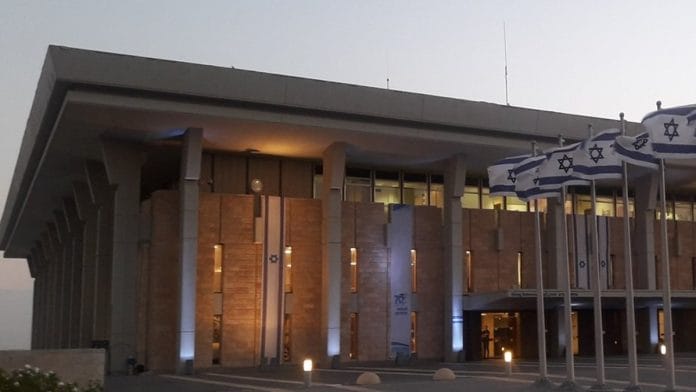New Delhi: The Parliament of Israel (Knesset) has passed the first of its controversial judicial reform laws, seeking to curb judicial review of government actions considered unreasonable by the country’s Supreme Court.
The reform has now cleared all three parliamentary readings required by a bill to become law.
While the reform has been described by the Benjamin Netanyahu government as a check on “judicial interference”, critics see it as a threat to democracy in Israel.
Since January this year, when the judicial reforms were unveiled by Justice Minister Yariv Levin, every Saturday has seen massive demonstrations across the cities of Israel, with even military reservists threatening a boycott.
Large-scale protests and clashes were also reported Monday.
The text of the bill makes it clear that the courts will not be able to invalidate decisions made by the government under the “reasonableness” judicial test — the courts will not be able to discuss government decisions and those of “other elected officials” who are not specified in the bill.
The law was passed by a vote of 64 for and 0 against as the opposition parties boycotted the final vote.
The current Netanyahu government is a coalition including far-Right parties, and has been described as Israel’s most Right-wing dispensation ever. The Right-wing voices in Israel have for long accused the Supreme Court of having a liberal bias.
ThePrint explains the law passed by the Israeli Parliament and what is at stake for Israel.
Also Read: Benjamin Netanyahu has won elections, but Israel has lost the battle for its own soul
The law
The text of the law, translated to English from Hebrew by media outlet Times of Israel, reads: “Notwithstanding what is stated in this basic law, whoever has judicial authority, according to the law, including the Supreme Court, will not deliberate on, and will not give an order against the government, the prime minister, government ministers, or other elected officials as will be defined in law, regarding the reasonableness of their decisions.”
Speaking in the Knesset earlier this month, Opposition leader and former deputy prime minister Benny Gantz criticised the law, saying the “significance of the law that you are seeking to advance here today is the beginning of a dangerous process of removing restrictions from the government and erasing judicial review”.
Simcha Rothman, a Member of Knesset (MK) from the leading coalition and believed to be the architect of the reforms, said in parliament that the reform would return authority to elected officials by removing court interference in administrative decisions.
During discussions on the law Monday, Levin asked “who decided that their [judges’] personal positions are better than those of the ministers”.
“There is no such thing and there can be no such thing. Because reasonableness is a worldview,” he said.
As the debates and voting around the first bill of the judicial reforms began in the Knesset, thousands of protesters gathered outside the building to demonstrate against it.
Broader judicial reforms
The broader judicial reforms, announced in January 2023, were introduced in the Knesset in February 2023. One of the bills that passed its first reading seeks to effectively ensure the selection of judges under the full control of the government.
This bill would also remove judicial oversight over Israel’s quasi-constitutional basic laws, blocking the courts from reviewing this bill. The new appointment process as envisioned by Benjamin Netanyahu’s government would redistribute the power on the ‘Judicial Selection Committee’, which currently has equal representation from the government and the legal profession.
It would remove two members of the Israel Bar Association, reducing the size of the committee to 9 representatives, with 3 members each from the executive, legislature and the judiciary.
The committee would be chaired by the justice minister along with two ministers from the government appointed by the Knesset. The head of the constitution committee (a ruling coalition MK) and one more coalition MK will be appointed by the Speaker of the Knesset. One MK representative from the opposition parties would also be part of the panel.
The Supreme Court president will represent the judiciary along with two retired judges selected by the justice minister after receiving approval from the Supreme Court president. Effectively, 5 out of 9 members in this reformed committee would represent the government, giving the politicians a majority to make judicial appointments.
The other proposed reform seeks to restrict the high court’s capacity to strike down laws.
“This block is also aimed at preventing high court scrutiny over the same basic law amendment bill that creates the mechanism,” Times of Israel explained in a report.
The Knesset would also be allowed by the bill to re-legislate any law struck down by the courts unless the law was struck down by a “unanimous majority”.
Another reform is allowing ministers in government to appoint their own legal advisers. In March this year, Prime Minister Netanyahu had suspended the judicial reforms to hold talks with the Opposition mediated by President Isaac Herzog.
The efforts failed.
Basic laws of Israel
The first Knesset was unable to put a constitution together. Instead, it began legislating basic laws on various subjects.
“After all the basic laws will be enacted, they will constitute together, with an appropriate introduction and several general rulings, the constitution of the State of Israel,” states the website of the Knesset.
According to the Knesset website, there are 13 basic laws. In the absence of a constitutional system, the judiciary is seen to serve as checks and balances to Israel’s legislature and executive.
(Edited by Sunanda Ranjan)
Also Read: Netanyahu signals impatience with protests as Israel’s judicial reform edges ahead






